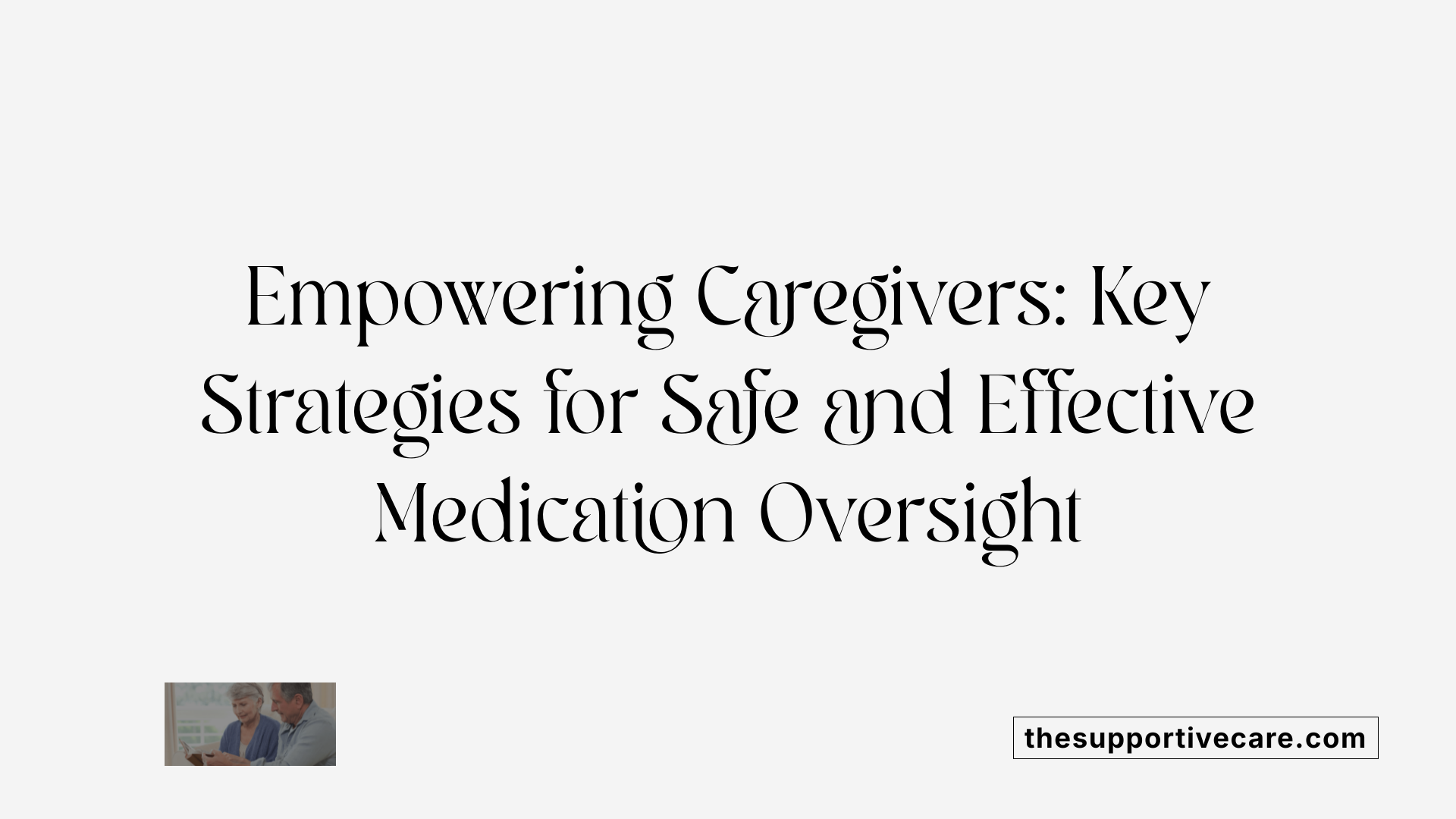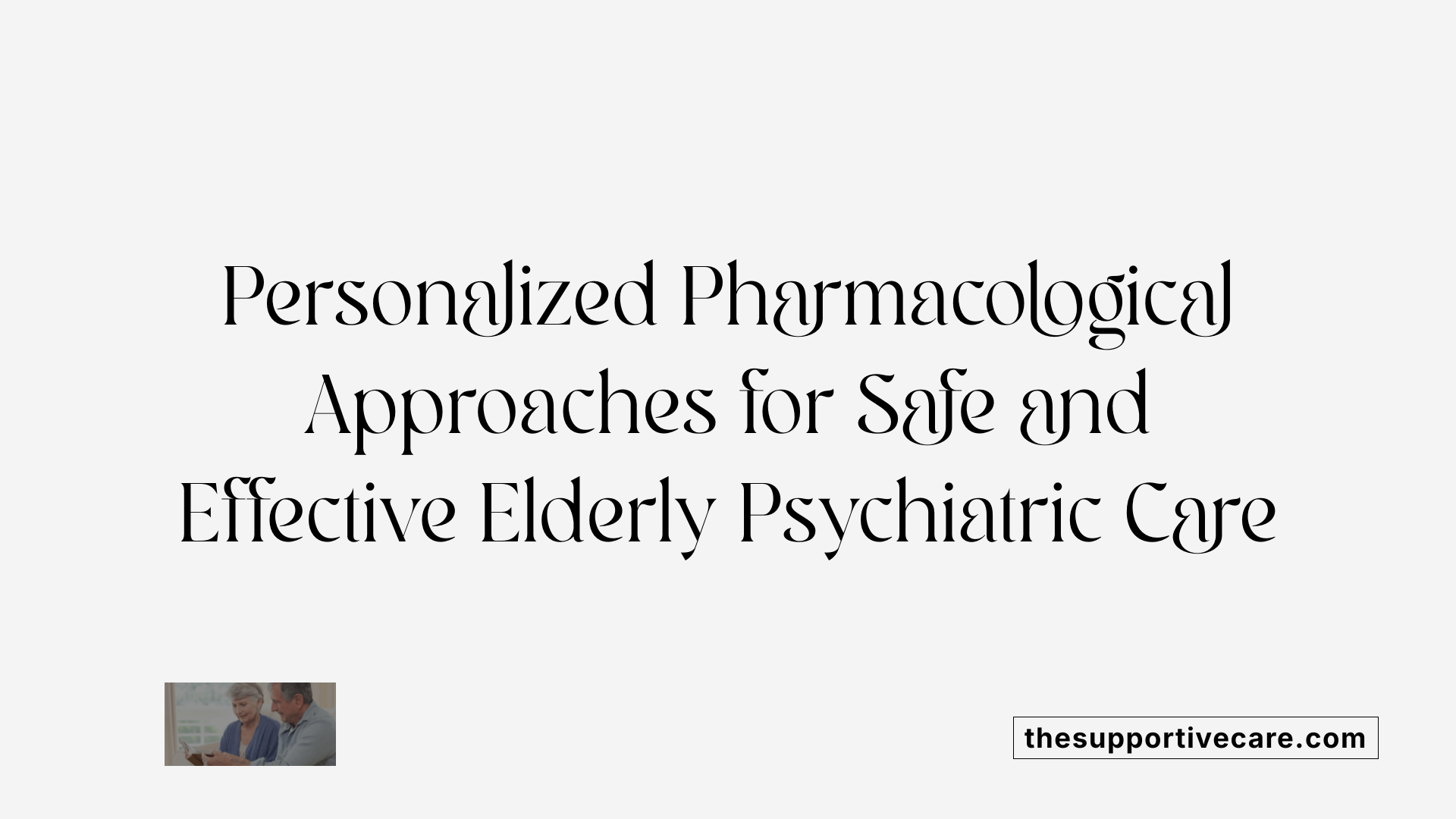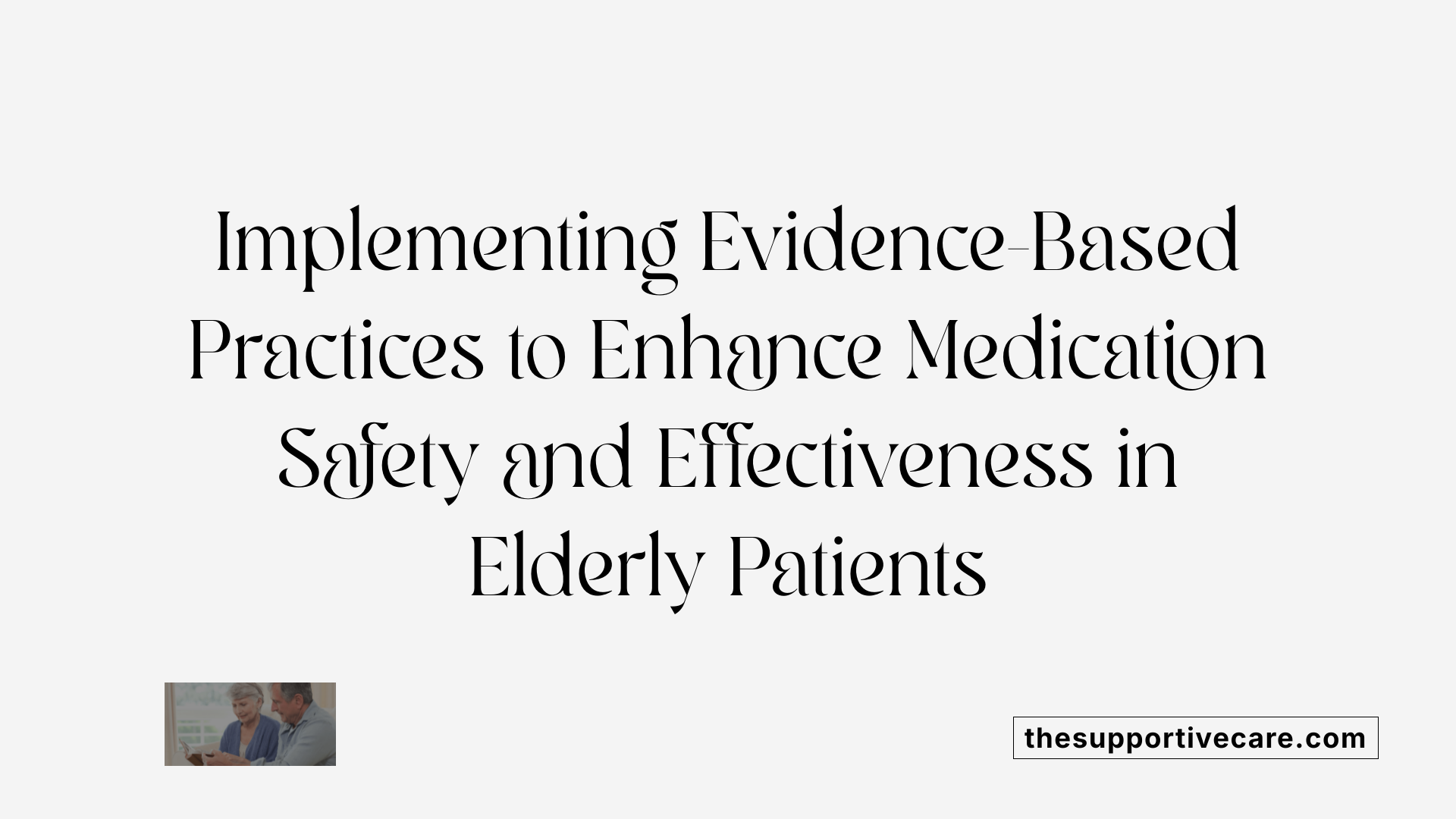Understanding the Nuances of Senior Psychiatric Medication Management
Managing psychiatric conditions in seniors is a complex, multifaceted challenge that requires careful consideration of age-related biological changes, systemic health issues, and individual patient needs. As the geriatric population continues to grow globally—reaching 67% of those aged 60 and over by 2020—the importance of effective medication management becomes increasingly vital. Proper strategies can improve mental health outcomes, ensure patient safety, and enhance quality of life for this vulnerable group.
The Critical Role of Caregivers in Medication Management

What is the role of caregivers in managing psychiatric medications for older adults?
Caregivers are essential partners in overseeing psychiatric medication routines for elderly residents. They help organize and administer medications, ensure adherence through reminders or pillboxes, and observe for any side effects or changes in condition.
Their responsibilities also include maintaining communication with healthcare providers, reporting concerns, and supporting medication adjustments when necessary. Caregivers often balance respecting the resident’s independence with providing needed assistance, emphasizing the importance of tailored strategies.
Supporting mental health involves emotional support, encouraging consistent medication use, and helping residents follow treatment plans. Proper caregiver involvement not only improves medication adherence but also enhances overall mental health outcomes, reduces risks of adverse effects, and prevents medication-related relapses.
Healthcare teams should actively involve caregivers. Open dialogue and education help caregivers understand medication instructions, recognize side effects early, and use helpful tools like medication lists or reminder apps. Overall, caregiving plays a vital role in safe, effective psychiatric medication management in nursing homes.
Addressing the Challenges of Psychiatric Medication Use in Seniors

What challenges and considerations are involved in managing psychiatric medications for elderly patients?
Managing psychiatric medications in seniors is a complex task that requires careful thought and ongoing monitoring. Age-related changes in the body significantly impact how drugs are processed, affecting absorption, distribution, metabolism, and excretion. These pharmacokinetic shifts can heighten the risk of drug toxicity and reduce medication effectiveness.
Older adults often face adherence issues due to cognitive decline, physical limitations, or complex medication routines. Memory problems, manual dexterity issues, or visual impairments can make it difficult for seniors to follow prescribed regimens consistently, leading to poor health outcomes. Negative beliefs about medications or side effects can also cause intentional nonadherence.
Polypharmacy—when residents take multiple medications for various health conditions—is common among nursing home residents. This increases the risk of drug interactions, adverse effects, and potentially inappropriate medication use such as anticholinergics or high-dose antipsychotics. These high-risk agents are associated with increased mortality, falls, and cognitive decline.
The system-wide challenges include communication gaps between healthcare providers, especially during care transitions, which can lead to medication errors or discrepancies. Regular medication reviews and coordination among primary care physicians, psychiatrists, pharmacists, caregivers, and residents are essential to optimize treatment and ensure safety.
Furthermore, systemic issues such as inadequate documentation, lack of patient or family involvement in decision-making, and resource limitations hinder effective management. Addressing these systemic barriers requires integrated care approaches, medication reconciliation, and personalized treatment plans that are simplified whenever possible.
In summary, successful management of psychiatric medications in elderly populations involves understanding age-related physiological changes, minimizing high-risk drugs, promoting adherence through education and support, and improving communication during healthcare transitions. These strategies collectively help reduce adverse events and support mental health stability in nursing home residents.
| Aspect | Consideration | Impact |
|---|---|---|
| Pharmacokinetics | Changes in drug absorption, metabolism, excretion | Increased toxicity risk, reduced effectiveness |
| Adherence | Cognitive and physical impairments | Nonadherence leading to poorer outcomes |
| Polypharmacy | Multiple medications for various conditions | Higher interactions, side effects |
| Communication | Care transitions, interdisciplinary coordination | Risk of errors and discrepancies |
| Systemic issues | Documentation, caregiver support, patient involvement | Barriers to safe, effective medication use |
Strategies for Deprescribing and Dose Optimization in the Elderly
What strategies exist for deprescribing and dose reduction in senior psychiatric care?
Managing medications in older adults, especially those in nursing homes, requires careful strategies to reduce the risks of polypharmacy and adverse drug reactions. One proven approach is conducting comprehensive medication reviews. This involves systematically examining all prescriptions, over-the-counter drugs, herbal supplements, and vitamins the resident takes.
Evidence-based tools such as the Beers Criteria, STOPP (Screening Tool of Older Persons' Prescriptions), and START (Screening Tool to Alert to Right Treatment) help identify potentially inappropriate medications (PIMs) that may pose more harm than benefit. These criteria guide healthcare providers in making informed decisions about which drugs can be safely reduced or discontinued.
A critical part of deprescribing is implementing gradual dose tapering. This means slowly reducing the medication dose over time while closely monitoring the resident’s response. Regular reassessment during this process helps ensure that symptoms are managed and side effects minimized. This person-centered approach respects the individual’s needs and preferences, contributing to safer outcomes.
Interdisciplinary collaboration is vital for successful deprescibing. Physicians, pharmacists, nurses, caregivers, and sometimes the residents themselves work together to plan and support medication changes. Shared decision-making ensures transparency and aligns treatment goals with the resident’s values.
Healthcare professionals also utilize clinical guidelines and decision support tools provided by reputable organizations. These guidelines offer evidence-based recommendations on medication management and safe dose reductions, streamlining decision-making processes.
Overcoming barriers such as clinician time constraints, resistance from residents or families, and communication challenges requires education and active engagement. By fostering an environment of trust and clearly explaining the benefits of deprescribing, healthcare teams can enhance acceptance.
In summary, combining thorough medication review, systematic tapering, collaborative planning, and adherence to clinical guidelines creates an effective framework for medication optimization in elderly psychiatric care.
| Strategy | Implementation Steps | Purpose |
|---|---|---|
| Medication Review | Use tools like Beers, STOPP, START | Identify inappropriate or unnecessary medications |
| Dose Tapering | Gradually reduce medication doses over time | Minimize withdrawal effects and monitor responses |
| Interdisciplinary Collaboration | Regular communication among care team members | Ensure safe, coherent treatment adjustments |
| Clinical Guidelines & Tools | Follow evidence-based protocols | Support decision-making and consistency in care |
| Education & Engagement | Share information with residents and families | Reduce resistance and improve adherence |
This integrated strategy helps ensure that medication regimens are safe, effective, and tailored to the unique needs of elderly residents.
Best Practices for Medication Management in Geriatric Psychiatry
What are the best practices for managing psychiatric medications in seniors?
Managing psychiatric medications in older adults requires a careful, structured approach to ensure safety and effectiveness. Regular medication reviews are an essential component, allowing healthcare providers to assess whether each medication still benefits the resident or if adjustments are needed. These reviews also help identify side effects or signs of overmedication, which are common concerns in geriatric care.
To enhance safety, professionals utilize screening tools such as the Beers Criteria, STOPP (Screening Tool of Older Persons’ potentially inappropriate Prescriptions), and NO TEARS (a mnemonic for avoiding certain drug classes). These tools assist in identifying medications that may pose risks, such as increased fall potential, cognitive impairment, or drug interactions.
A collaborative, multidisciplinary team approach is vital. This team often includes primary care physicians, psychiatrists, pharmacists, nursing staff, and caregivers. Working together facilitates personalized treatment plans that consider the physical health, cognitive abilities, and social context of each resident.
Effective medication management also involves employing adherence aids like pill organizers, medication reminder apps such as MyDoses, and simplifying dosing schedules to support residents with cognitive or physical difficulties. Educating residents and their families about medication purpose, possible side effects, and proper storage promotes safety and adherence.
Moreover, deprescribing unnecessary or potentially harmful medications—especially in cases of polypharmacy—can reduce adverse effects and improve quality of life. Continual monitoring and adjustments based on ongoing assessments make certain that residents receive the most suitable, safe, and effective psychiatric care.
In summary, the best practices encompass comprehensive reviews, risk assessment tools, interdisciplinary collaboration, personalized and understandable treatment plans, and ongoing monitoring—creating a holistic framework that prioritizes the well-being of elderly patients.
Pharmacological Considerations: Tailoring Treatment to Seniors

What pharmacological considerations are specific to seniors with psychiatric conditions?
Treating psychiatric conditions in elderly residents requires careful attention to how aging affects medication use. As people age, their bodies undergo changes that influence how drugs are absorbed, distributed, metabolized, and excreted. This means medications can have different effects in seniors compared to younger adults, often increasing the risk of adverse reactions.
Elderly patients tend to be more sensitive to certain drugs, such as sedatives, anticholinergics, and some cardiovascular medications. This heightened sensitivity can lead to side effects like increased fall risk, memory problems, or cardiovascular complications. Because older adults often have multiple health conditions, they are frequently on several medications at once—this is called polypharmacy. Polypharmacy increases the chance of drug interactions, which can diminish efficacy or cause harmful effects.
To minimize risks, dose adjustments based on kidney and liver function are crucial. Renal function typically declines with age, affecting drug clearance, while hepatic metabolism may slow, leading to longer drug half-lives and potential toxicity. Regular monitoring of renal and hepatic parameters helps guide safe prescribing.
Nonpharmacological approaches, such as therapy, physical activity, and social engagement, should be considered first whenever possible. When medications are necessary, close oversight is important for detecting side effects like QT prolongation, serotonergic syndromes, or extrapyramidal symptoms.
In summary, pharmacological management in older adults with psychiatric conditions must account for physiological changes, drug sensitivities, interaction risks, and organ function. Personalized treatment plans, which involve starting at low doses, gradual titration, and ongoing assessment, are essential to ensure safety and effectiveness.
Supporting Evidence-Based Interventions for Mental Health and Medication Safety

What evidence-based interventions support medication management in older adults with mental health issues?
Effective management of psychiatric medications in elderly residents involves several evidence-based strategies. One of the most critical components is conducting comprehensive medication reviews and reconciliation. These reviews help identify discrepancies between prescribed medications and what residents are actually taking, revealing issues such as duplicate therapies, unnecessary drugs, or harmful interactions.
A multidisciplinary, patient-centered approach is recommended to optimize treatment. This includes behavioral and educational strategies tailored to overcome sensory, cognitive, and physical impairments common in seniors. For example, using visual aids, larger labels, and easy-open containers makes medication instructions clearer.
Pharmacist-led counseling plays a vital role. Pharmacists can provide personalized education, address concerns about side effects, and support adherence through practical solutions like reminders and simplified dosing schedules.
System-based tools such as medication reminder apps, sensor-based adherence devices, and simplified medication regimens significantly boost ongoing compliance. These tools can help residents follow their routines consistently, which is especially important when routines are disrupted due to illness or cognitive decline.
Regular monitoring and shared decision-making are essential components. Involving residents and their families in treatment discussions ensures that medications are aligned with personal preferences and overall health goals.
Finally, deprescribing unnecessary or high-risk medications using evidence-based guidelines such as Beers criteria or STOPP/START helps reduce adverse drug events. Prioritizing the safety and effectiveness of treatment can lead to improved quality of life and better mental health outcomes for elderly residents.
Monitoring and Optimizing Psychiatric Medications in Seniors
How can medication use be monitored and optimized for mental health in seniors?
Monitoring psychiatric medications in elderly residents requires a comprehensive approach that combines regular clinical assessments with specific screening tools and diagnostic tests. Consistent evaluation allows healthcare providers to gauge medication effectiveness, identify side effects early, and adjust treatment plans accordingly.
Screening instruments like the PHQ-9 for depression and the GAD-7 for anxiety are valuable for measuring symptom severity and tracking changes over time. These tools help determine whether medications are providing relief or if adjustments are needed.
Blood tests and detailed clinical evaluations are essential parts of monitoring. They can detect adverse drug reactions, assess organ function (especially kidney and liver health), and identify potential drug interactions, especially since older adults often take multiple medications.
To improve safety, medication regimens should be regularly reviewed to minimize polypharmacy. Using guidelines such as the Beers Criteria helps identify potentially inappropriate medications that pose higher risks for elderly residents.
Adjustments in medication plans might involve switching to safer or more effective alternatives. For instance, moving from medications with high anticholinergic burden to agents like vortioxetine or aripiprazole, which tend to have more favorable side-effect profiles.
Care teams should also incorporate non-pharmacological strategies such as therapy and social engagement to complement medication effects. Engaging residents in discussions about their treatment options fosters shared decision-making, enhancing adherence and satisfaction.
Routine follow-up is crucial. It ensures that any emerging issues are promptly managed, reducing adverse effects like cognitive decline or falls, and preventing overmedication. Overall, a personalized, vigilant approach helps optimize mental health outcomes while safeguarding resident safety.
Effective Treatment Modalities for Elderly Mental Health Conditions
What approaches are effective in treating depression and other mental health conditions in elderly populations?
Treating mental health conditions like depression among seniors requires a comprehensive and personalized approach. Psychotherapy, especially cognitive-behavioral therapy (CBT), has proven beneficial for this age group. Group therapy sessions with CBT can improve social interaction and provide emotional support, making them highly effective.
Medications, mainly second-generation antidepressants such as selective serotonin reuptake inhibitors (SSRIs) like sertraline and escitalopram, are often prescribed. However, medication management in elderly patients must be done with caution. Changes in pharmacokinetics and pharmacodynamics due to aging increase the risk of side effects and drug interactions. Regular monitoring, starting with the lowest effective dose, and ongoing assessment are essential.
For severe or treatment-resistant cases, advanced options like electroconvulsive therapy (ECT) and repetitive transcranial magnetic stimulation (rTMS) can be considered. These treatments require careful evaluation but can be effective when other therapies have failed.
Lifestyle modifications also play a vital role. Encouraging physical activity, social engagement, and participation in enjoyable activities not only help prevent depression but also improve overall well-being. Combining therapy, medication, and lifestyle changes offers a holistic approach that best supports mental health in elderly adults.
| Approach | Description | Additional Notes |
|---|---|---|
| Psychotherapy | Cognitive-behavioral therapy (CBT), group sessions | Proven effective, enhances social skills |
| Pharmacotherapy | SSRIs, SNRIs, atypical antidepressants | Need cautious dosing, regular supervision |
| Advanced treatments | ECT, rTMS | For severe or resistant depression |
| Lifestyle | Exercise, social activities, hobbies | Supports mental health, improves quality of life |
Ongoing research and interdisciplinary care emphasize that tailored, integrative treatment plans significantly improve outcomes for elderly individuals facing mental health challenges.
Holistic and Personalized Approaches for Optimal Outcomes
Effective navigation of psychiatric medication management in seniors hinges on a holistic, interdisciplinary, and person-centered approach. Regular medication reviews, patient and caregiver education, tailored treatment plans, and vigilant monitoring serve as the cornerstones of safe and efficacious care. Integrating pharmacological with non-pharmacological interventions underscores the importance of personalized strategies that respect the unique physiological and psychological needs of older adults. As healthcare systems evolve and the elderly population expands, embracing evidence-based practices and fostering collaborative care models will be essential for achieving optimal mental health outcomes and enhancing the quality of life for seniors.
References
- Navigating Psychiatric Medication Management in Nursing ...
- Medication Management for Seniors: Challenges and ...
- Psychiatric Medication Management: A Guide for Caregiver
- The Geriatric Population and Psychiatric Medication - PMC
- Uplifting Lives: 8 Key Strategies for Depression Medication ...
- A Guide to Medication Management
- Medication Management of the Community-Dwelling Older ...


































































































